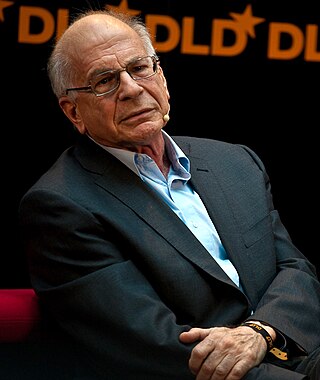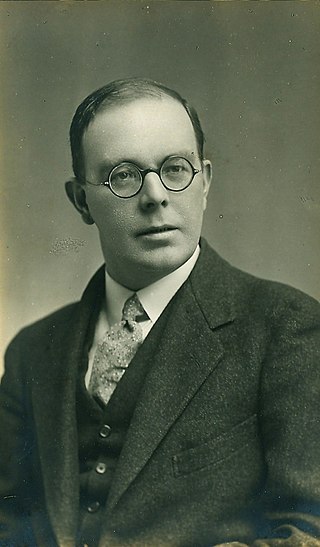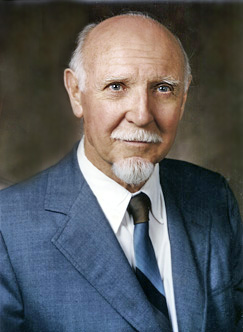Related Research Articles
John Philippe Rushton was a Canadian psychologist and author. He taught at the University of Western Ontario until the early 1990s, and became known to the general public during the 1980s and 1990s for research on race and intelligence, race and crime, and other purported racial correlations.
Psychology is the scientific study of mind and behavior. Its subject matter includes the behavior of humans and nonhumans, both conscious and unconscious phenomena, and mental processes such as thoughts, feelings, and motives. Psychology is an academic discipline of immense scope, crossing the boundaries between the natural and social sciences. Biological psychologists seek an understanding of the emergent properties of brains, linking the discipline to neuroscience. As social scientists, psychologists aim to understand the behavior of individuals and groups.

Alfred Binet, born Alfredo Binetti, was a French psychologist who together with Théodore Simon invented the first practical intelligence test, the Binet–Simon test. In 1904, Binet took part in a commission set up by the French Ministry of Education to decide whether school children with learning difficulties should be sent to a special boarding school attached to a lunatic asylum, as advocated by the French psychiatrist Désiré-Magloire Bourneville, or whether they should be educated in classes attached to regular schools as advocated by the Société libre pour l'étude psychologique de l'enfant (SLEPE) of which Binet was a member. There was also debate over who should decide whether a child was capable enough for regular education. Bourneville argued that a psychiatrist should do this based on a medical examination. Binet and Simon wanted this to be based on objective evidence. This was the beginning of the IQ test. A preliminary version was published in 1905. The full version was published in 1908, and slightly revised in 1911, just before Binet's death.

Daniel Kahneman was an Israeli-American psychologist best-known for his work on the psychology of judgment and decision-making as well as behavioral economics, for which he was awarded the 2002 Nobel Memorial Prize in Economic Sciences together with Vernon L. Smith. Kahneman's published empirical findings challenge the assumption of human rationality prevailing in modern economic theory. Kahneman became known as the "grandfather of behavioral economics."

Sir Cyril Lodowic Burt, FBA was an English educational psychologist and geneticist who also made contributions to statistics. He is known for his studies on the heritability of IQ.

Albert Bandura was a Canadian-American psychologist. He was a professor of social science in psychology at Stanford University.
Humanistic psychology is a psychological perspective that arose in the mid-20th century in answer to two theories: Sigmund Freud's psychoanalytic theory and B. F. Skinner's behaviorism. Thus, Abraham Maslow established the need for a "third force" in psychology. The school of thought of humanistic psychology gained traction due to Maslow in the 1950s.
James Jerome Gibson was an American psychologist and is considered to be one of the most important contributors to the field of visual perception. Gibson challenged the idea that the nervous system actively constructs conscious visual perception, and instead promoted ecological psychology, in which the mind directly perceives environmental stimuli without additional cognitive construction or processing. A Review of General Psychology survey, published in 2002, ranked him as the 88th most cited psychologist of the 20th century, tied with John Garcia, David Rumelhart, Louis Leon Thurstone, Margaret Floy Washburn, and Robert S. Woodworth.

Raymond Bernard Cattell was a British-American psychologist, known for his psychometric research into intrapersonal psychological structure. His work also explored the basic dimensions of personality and temperament, the range of cognitive abilities, the dynamic dimensions of motivation and emotion, the clinical dimensions of abnormal personality, patterns of group syntality and social behavior, applications of personality research to psychotherapy and learning theory, predictors of creativity and achievement, and many multivariate research methods including the refinement of factor analytic methods for exploring and measuring these domains. Cattell authored, co-authored, or edited almost 60 scholarly books, more than 500 research articles, and over 30 standardized psychometric tests, questionnaires, and rating scales. According to a widely cited ranking, Cattell was the 16th most eminent, 7th most cited in the scientific journal literature, and among the most productive psychologists of the 20th century. He was a controversial figure due in part to his friendships with, and intellectual respect for, white supremacists and neo-Nazis.
Robert Duncan Luce was an American mathematician and social scientist, and one of the most preeminent figures in the field of mathematical psychology. At the end of his life, he held the position of Distinguished Research Professor of Cognitive Science at the University of California, Irvine.
Quantitative psychology is a field of scientific study that focuses on the mathematical modeling, research design and methodology, and statistical analysis of psychological processes. It includes tests and other devices for measuring cognitive abilities. Quantitative psychologists develop and analyze a wide variety of research methods, including those of psychometrics, a field concerned with the theory and technique of psychological measurement.
Leda Cosmides is an American psychologist, who, together with anthropologist husband John Tooby, pioneered the field of evolutionary psychology.
Raymond D. Fowler was an American psychologist and Professor Emeritus of the University of Alabama. He was president of the American Psychological Association (1988) and served as APA's executive vice president and chief executive officer (CEO) from 1989 to 2003.

Neal Elgar Miller was an American experimental psychologist. Described as an energetic man with a variety of interests, including physics, biology and writing, Miller entered the field of psychology to pursue these. With a background training in the sciences, he was inspired by professors and leading psychologists at the time to work on various areas in behavioral psychology and physiological psychology, specifically, relating visceral responses to behavior.
Steven C. Hayes is an American clinical psychologist and Nevada Foundation Professor at the University of Nevada, Reno Department of Psychology, where he is a faculty member in their Ph.D. program in behavior analysis. He is known for developing relational frame theory, an account of human higher cognition. He is the co-developer of acceptance and commitment therapy (ACT), a popular evidence-based form of psychotherapy that uses mindfulness, acceptance, and values-based methods, and is the co-developer of process-based therapy (PBT), a new approach to evidence-based therapies more generally. He also coined the term clinical behavior analysis.
Christopher Darren Green is professor of psychology at York University in Toronto, Ontario, Canada. He has been cross-appointed to the graduate philosophy and science and technology studies programs as well. His research mostly pertains to the history of psychology, though he also writes on methodological and statistical issues in psychology.
Raymond F. Paloutzian is a professor of psychology (emeritus) at Westmont College in Santa Barbara, California. For many years he edited the International Journal for the Psychology of Religion. Paloutzian's main fields of scholarship are social psychology and the psychology of religion. In the latter he is the author of an introductory textbook, and the lead editor of two handbooks.
History of Psychology refers to the academic discipline concerned with studying the history of the study of psychology. Another term would be historiography of psychology. Postsecondary course titles and textbooks often combine history and systems of psychology; one chapter may address the history and tenets of structuralism, a subsequent chapter functionalism, a subsequent chapter behaviorism, etc.
Stuart Vyse is an American psychologist, teacher, speaker and author who specializes in belief in superstitions and critical thinking. He is frequently invited as a speaker and interviewed by the media as an expert on superstitious behavior. His book Believing in Magic: The Psychology of Superstition won the American Psychological Association's William James Book Award.
Alexandra Rutherford is a professor of psychology at York University's History and Theory of Psychology Graduate Program and author of Beyond the Box: B. F. Skinner's Technology of Behavior from Laboratory to Life, 1950s-1970s and Pioneers of Psychology.
References
- 1 2 3 Sheehy, Noel; Chapman, Antony J.; Conroy, Wenday A. (2016-01-08). Biographical Dictionary of Psychology. Routledge. p. 180. ISBN 978-1-136-79885-6.
- ↑ "Raymond Fancher Jr. Weds Susan Cogburn". The New York Times. 1964-02-08. ISSN 0362-4331 . Retrieved 2021-11-29.
- ↑ "Raymond E. Fancher". wwnorton.com. Retrieved 2021-11-29.
- ↑ "Journal of the History of the Behavioral Sciences". York University. Retrieved 2021-11-29.